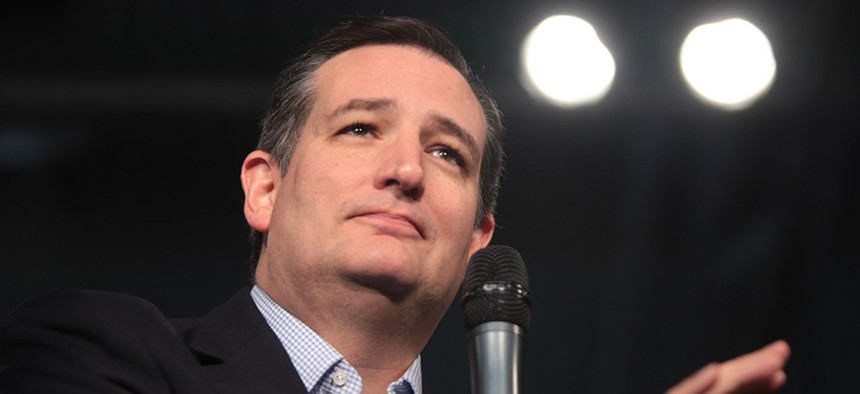
Flickr user Gage Skidmore
How a Bureaucratic Job Turned Ted Cruz Into a Political Renegade
When he joined George W. Bush’s campaign, ending up at a small federal agency wasn’t what he had in mind.
Sixteen years ago, when a young Ted Cruz moved to Austin, Texas, to work in the presidential campaign of George W. Bush, he had big aspirations. A lawyer by training and an indefatigable political operator, he envisioned ending up as White House counsel in a Bush administration.
Things turned out a bit differently. “When Bush won, however,” Shane Goldmacher and Daniel Lippman write in Politico Magazine today, “Cruz would not get the White House post he had dreamed of; instead, he found himself in the bureaucratic backwater of the Federal Trade Commission.”
“I burned some bridges on that campaign,” Cruz told Politico, blaming his youth and immaturity. “It was a difficult chapter when you poured your heart into something for two years and the desires of your heart are denied. That’s hard. And particularly when you’re seeing so many of your friends rewarded.”
The desires of Cruz’s heart involved working in the West Wing. The problem was his relative lack of experience and tendency toward self-promotion.
So Cruz had to settle first for a stint at the Justice Department and then a high-ranking position at the FTC, where he apparently threw himself into his work. Indeed, during his tenure at the FTC from July 2001 to January 2003, “he earned a reputation as a passionate boss intent on tracking the success of the office’s efforts in granular detail,” Jim Geraghty reported in National Review last year.
In a year and a half on the job, Cruz “proposed an ambitious agenda that featured efforts to roll back regulations on teacher certification, hospital accreditation and local governments’ agreements with cable television,” Geraghty wrote. What’s more, wrote Asheesh Agarwal and John Delacourt in PJ Media last year, “almost all of Cruz’s initiatives received unanimous support among both Republicans and Democrats.”
But in the end, Cruz wasn’t in the game to push policy at some acronymic outpost, or be a professional consensus-builder. He had bigger dreams. And as it turned out, in order to fulfill them he would end up working not just outside the bureaucracy, but outside the political establishment, too.







